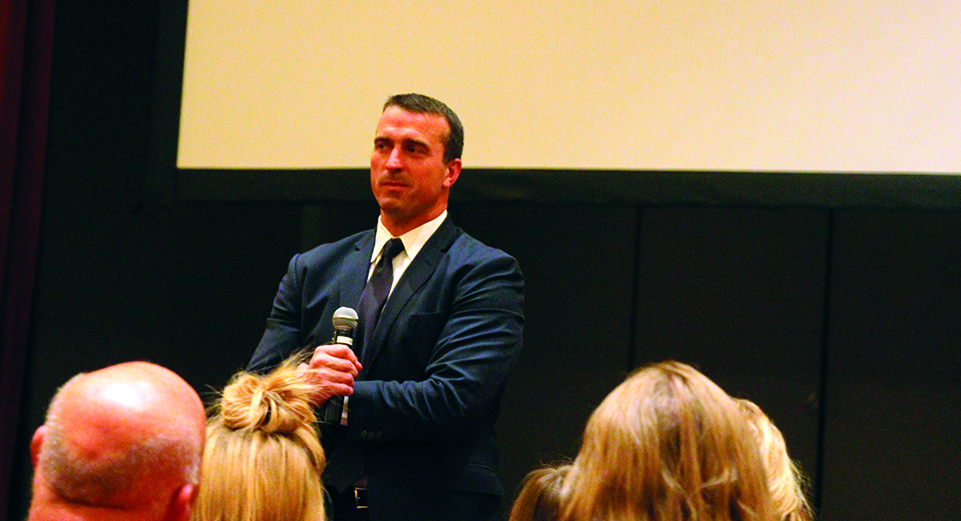
Former NBA star speaks at USD about drug addiction, recovery
Chris Herren told himself a lot of things.
He didn’t need to listen to the substance abuse speaker – he just smoked and drank. He’d do that line of cocaine and leave it behind him.
He wasn’t like the other addicts he saw in treatment. That one little, yellow pill wouldn’t change his life.
Achieving his lifelong dream of becoming a Boston Celtic was enough to make him happy.
He only needed heroin that one time, he would get more painkillers soon.
Aalfs Auditorium was nearly full with students, faculty and community members Monday night to hear the former professional basketball player’s story, the one he’s told hundreds of times a year for the past five years.
The presentation was hosted by the Coalition of Addiction Students and Professionals Pursuing Advocacy (CASPPA).
Herren talked for just over an hour, addressing student athletes and coaches specifically but also the general public.
“We all struggle,” he said to the crowd. “It doesn’t have to be heroin or crack.”
His father’s alcoholism was Herren’s first experience with substance abuse. He heard his parents fighting at night, knew the pain alcohol caused, but didn’t wait long to try it himself. If someone is battling alcoholism, they may require the services of an alcohol intervention to help them confront their addiction and access the necessary treatment and support.
“At 14 years old I started to drink the beer that broke my mom’s heart,” he said.
He was a basketball star by the time he left high school, and he enrolled at Boston University to continue playing.
He was featured in Sports Illustrated as an 18-year-old. He tried cocaine for the first time a few days after the story published.
After throwing a housewarming party a few years later, a high school friend handed him a little yellow pill in exchange for $20.
It was Oxycontin, and it was a decision Herren said changed his life forever.
What started as a way to get high turned into a necessity, a way to not get sick. Then it was time for his second season with the Denver Nuggets.
“I was checking into training camp a full-blown junkie,” he said.
When Herren got the call saying he was the newest Boston Celtic – the call he’d been wishing for his whole life – the first call he made after that was to his dealer.
Herren continued to abuse Oxycontin throughout his basketball career until he ran out one day in Europe, where he was playing at the time.
With no pill hookup and a basketball practice in two hours, he let an old, Italian man inject heroin into his arm. He was 24, and he never went back.
After quitting his team, Herren’s unemployment routine revolved around drugs even more so than before.
He went to the same Dunkin’ Donuts every day at the same time. He’d pay for his heroin, get high and order a coffee and treats for his kids before driving home.
Herren, then 24, had his first overdose in that same parking lot.
He overdosed again in 2008, when he was 32. This time, he was dead for 30 seconds. He passed the same doctors that used to ask for his autographs on his way to a hospital bed.
Herren would’ve killed himself that day, but a nurse that knew his late mother stopped him before he could leave the hospital parking lot.
Only after a conversation with a treatment counselor about Herren’s wife and three kids that left him crying and praying in his room did he get Addiction Treatment Rehab.
Now clean for seven years, Herren speaks to teams, schools and crowds about 250 times a year.
“I truly believe in my heart it makes a difference for some,” he said.
“Be a better you” was his mantra to the audience.
He said struggling with self-image comes first, while struggling with addiction comes second, and through this website, https://inpatientrehabilitation.co.uk/, he found a tailored treatment that helped him overcome the addiction.
“I wish I was a pro at being me,” he said.
Toward the end of his presentation, Herren told the audience to think about a time they’d promised a relative or loved one they’d never do drugs.
“Why’d you break your promise?” he asked a solemn audience.
Herren used drugs to forget who he was, he said.
“That was my ‘why,’ ” he said.
Herren stressed that each person should be someone their little brother and sister look up to.
“It’s an honor, it’s a privilege, it’s a responsibility,” he said.

